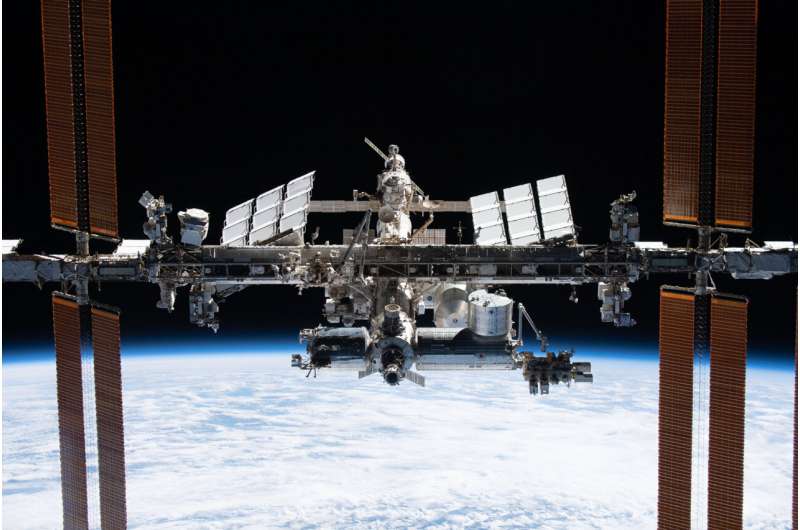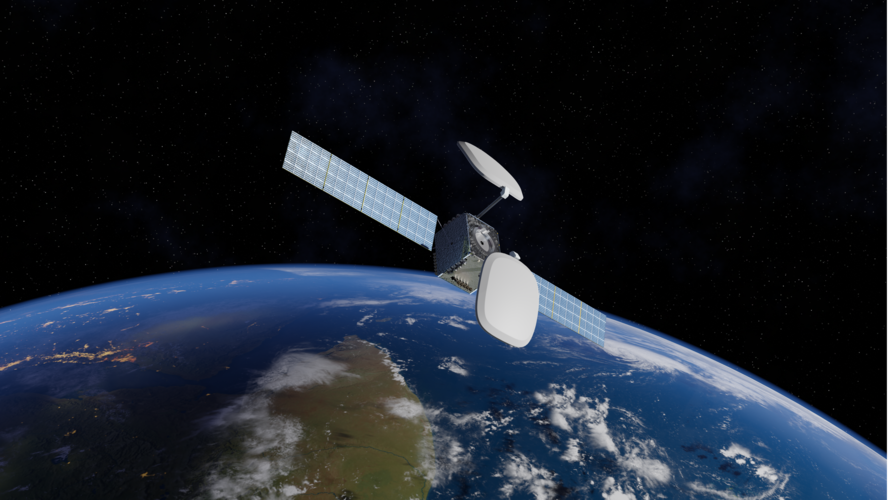
Copernical Team
Space junk forces spacewalk delay, too risky for astronauts

Image: ISS captured from the SpaceX Crew Dragon Endeavour

It can be hard to appreciate that a human-made, football-pitch-sized spacecraft is orbiting 400 km above our heads, but there it is.
The jewel of human cooperation and ingenuity that is the International Space Station shines brightly in this image captured by ESA astronaut Thomas Pesquet from the SpaceX Crew Dragon Endeavour.
Crew-2 got this amazing view during a flyaround of the orbiting lab after undocking from the Harmony module on 8 November, before their return to Earth.
Since this image was taken, there has even been a new addition in the form of the Russian Node Module, known as Prichal. The final Russian module planned for the station, it is a spherical node attached to the Russian segment with six docking ports for future Progress and Soyuz arrivals.
A collaboration between five space agencies, the station has become a symbol of peaceful international cooperation for 23 years now. It represents the best of our space engineering capabilities as well as humankind's pursuit of scientific knowledge and exploration.
By any standards, it is an incredible piece of spacecraft engineering. Weighing 420 tons, it travels in low-Earth orbit at more than 27 000 km/hour, circling Earth approximately 16 times every day.
Micro-geostationary satellite wins ESA support

A small European telecommunications satellite intended for launch into geostationary orbit some 36 000 kilometres above the Earth – which can be used as a basis for future satellites – has won support from ESA.
Brain and coat from RUAG Space for Galileo navigation satellites
 On Thursday, December 2 (CET) another two Galileo navigation satellites will be launched from Kourou in French Guiana aboard a Soyuz rocket. This will raise the number of Galileo satellites in orbit from currently 26 to 28. All Galileo satellites use products from RUAG Space, a leading supplier to the space industry.
"We have played an important role in building the European Galileo naviga
On Thursday, December 2 (CET) another two Galileo navigation satellites will be launched from Kourou in French Guiana aboard a Soyuz rocket. This will raise the number of Galileo satellites in orbit from currently 26 to 28. All Galileo satellites use products from RUAG Space, a leading supplier to the space industry.
"We have played an important role in building the European Galileo naviga Kacific enables mobile operators to provide better service to customers
 Kacific Broadband Satellites has introduced the first Ka-band Mobile Backhaul service for Internet Service Providers (ISPs) and telecom operators in Southeast Asia and the Pacific. This will allow operators to extend their network's range in remote and difficult areas and provide them with an effective way of easing congestion in high-demand urban environments.
Mobile Backhaul is part of K
Kacific Broadband Satellites has introduced the first Ka-band Mobile Backhaul service for Internet Service Providers (ISPs) and telecom operators in Southeast Asia and the Pacific. This will allow operators to extend their network's range in remote and difficult areas and provide them with an effective way of easing congestion in high-demand urban environments.
Mobile Backhaul is part of K Knight Sky LLC joins NIC4 to expand critical connectivity solutions for globally
 NIC4, a division of Network Innovations, Inc., announces the acquisition of U.S. government contractor, Knight Sky LLC. The acquisition will effectively combine the expertise of both companies, enhancing the development and delivery of agile, secure and mission critical connectivity solutions for the collective clients of each organization.
NIC4 will complement the existing Knight Sky mana
NIC4, a division of Network Innovations, Inc., announces the acquisition of U.S. government contractor, Knight Sky LLC. The acquisition will effectively combine the expertise of both companies, enhancing the development and delivery of agile, secure and mission critical connectivity solutions for the collective clients of each organization.
NIC4 will complement the existing Knight Sky mana First LoRa message bounced off the moon
 For the first time ever we bounced a LoRa message off the moon on October 5th 2021, using the Dwingeloo radio telescope. This first was achieved by a team consisting of Jan van Muijlwijk (CAMRAS, PA3FXB), Tammo Jan Dijkema (CAMRAS), Frank Zeppenfeldt (ESA, PD0AP) and Thomas Telkamp (Lacuna Space, PA8Z). The signal traveled an amazing distance of 730,360 km, which to our knowledge is the furthest
For the first time ever we bounced a LoRa message off the moon on October 5th 2021, using the Dwingeloo radio telescope. This first was achieved by a team consisting of Jan van Muijlwijk (CAMRAS, PA3FXB), Tammo Jan Dijkema (CAMRAS), Frank Zeppenfeldt (ESA, PD0AP) and Thomas Telkamp (Lacuna Space, PA8Z). The signal traveled an amazing distance of 730,360 km, which to our knowledge is the furthest NASA starts loading fuel for James Webb Space Telescope launch
 NASA is loading fuel and oxidizer into the James Webb Space Telescope in the Guiana Space Center ahead of its scheduled December 22 launch.
Teams at the space center in French Guiana are loading 63 gallons of fuel and oxidizer into the $9.7 billion telescope, which is the largest and most powerful telescope ever conceived.
The Webb telescope, an international partnership among NA
NASA is loading fuel and oxidizer into the James Webb Space Telescope in the Guiana Space Center ahead of its scheduled December 22 launch.
Teams at the space center in French Guiana are loading 63 gallons of fuel and oxidizer into the $9.7 billion telescope, which is the largest and most powerful telescope ever conceived.
The Webb telescope, an international partnership among NA Testing confirms Webb Telescope on track for targeted Dec 22 Launch
 Engineering teams have completed additional testing confirming NASA's James Webb Space Telescope is ready for flight, and launch preparations are resuming toward Webb's target launch date of Wednesday, Dec. 22, at 7:20 a.m. EST.
Additional testing was conducted this week to ensure the observatory's health following an incident that occurred when the release of a clamp band caused a vibrati
Engineering teams have completed additional testing confirming NASA's James Webb Space Telescope is ready for flight, and launch preparations are resuming toward Webb's target launch date of Wednesday, Dec. 22, at 7:20 a.m. EST.
Additional testing was conducted this week to ensure the observatory's health following an incident that occurred when the release of a clamp band caused a vibrati Alaska scientist reveals cause of lost magnetism at meteorite site
 A University of Alaska Fairbanks scientist has discovered a method for detecting and better defining meteorite impact sites that have long lost their tell-tale craters. The discovery could further the study of not only Earth's geology but also that of other bodies in our solar system.
The key, according to work by associate research professor Gunther Kletetschka at the UAF Geophysical Inst
A University of Alaska Fairbanks scientist has discovered a method for detecting and better defining meteorite impact sites that have long lost their tell-tale craters. The discovery could further the study of not only Earth's geology but also that of other bodies in our solar system.
The key, according to work by associate research professor Gunther Kletetschka at the UAF Geophysical Inst 